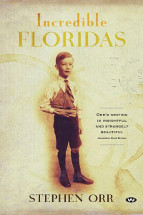Incredible Floridas by Stephen Orr

Wakefield Press, 2017. ISBN 9781743055076
(Age: 15+) It is interesting to speculate about the historical
details, which may have inspired Stephen Orr to write this cleverly
constructed novel. Incredible Floridas is mentioned in a poem by the
revolutionary poet of the 19th century, Rimbaud. The Australian
composer Richard Meale wrote an instrumental piece by the same name;
a homage to Rimbaud. Peter Weir made a short film, also of the same
name, which encapsulated Meale and this music piece. So here is a
writer also drawn to the world of the arts, often intangible and
subtle.
The post-war Australian art scene forms the backdrop to the novel,
and the author himself suggests that the character of Hal's father
is based on Russell Drysdale. The reader senses this, when the
family and Roland's fellow artists discuss his paintings and his
depiction of figures and landscapes.
Hal is an inward looking boy, and this becomes clearer as his
parents observe him at school and with the jobs he takes on as he
moves into adolescence. Hal is frustrated that everything his father
looks at is in terms of a painting. Roland only very gradually
realises that his son is drifting dangerously. Ena, his mother, is
very concerned that Hal knows how to behave; yet she fails to
understand his misdemeanours, until it is too late.
Orr relies on dialogue to explore character; for this reason it is
difficult to visualise the surrounds. Is that important, though, in
a novel, which investigates the elusive?
However I enjoyed the numerous historical references to Adelaide; we
visit Thebarton, Maugham Church and Torrens Road; and the
well-researched fragments of domestic life in the 50s and 60s. These
ground the reader in real time.
Throughout, the story moves from the present to the past and back
again, but any confusion is avoided with cleverly constructed
dialogue.
Julie Wells